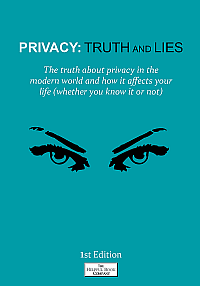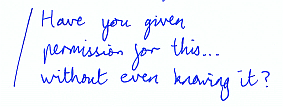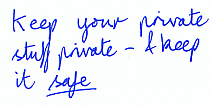The Truth About Privacy in the Modern World and How it Affects Your Life
(whether you know it or not)

Privacy: Truth and Lies. The Truth about Privacy in the Modern World and How it Affects Your Life (whether you know it or not)
People talk about “privacy” as if it’s some vague, “in the clouds” sort of thing.
It isn’t.
It’s about people watching what you do. I don’t mean just what web pages you visit, though that’s part of it. I mean:
![]()
Do you know whether your email company has computers reading every email you send?
![]()
Could you tell whether a hacker has got access to your emails and can read each email you send or receive… or even change them (Some hackers have made a fortune out of changing bank details in emails from solicitors so people pay their house deposit to the hacker instead of the solicitor).
![]()
Do you know whether Google are tracking you even when you leave the house? (I checked and they know pretty much all my movements from last year, including when and where I went on holiday, what route I drove and when I came home.)
![]()
And do you know what other data the Government, Microsoft, Google, Facebook and hundreds of other tracking companies have on you… and what they do with it? I doubt it – they don’t exactly shout about it. (Not to mention the small time hackers and the international organised crime groups.)
Of course, you might say “I don’t mind, they won’t do anything bad with all that information – I trust the Government” (And Facebook, Google and the others… probably not the organised crime groups, though!)
Or email [email protected] or call 01229 777606
Do you trust every single person there?
Fair enough – but do you trust every single person who works there? And do you trust them never to get hacked? Or never to leave a laptop with sensitive information on a train (scary – but this has happened, more than once).
Or you might say “It’s not like I’m into money laundering or drug dealing – I’ve got nothing to hide. So it doesn’t matter if they know all about me.”
Sounds reasonable – but once you know what information is being collected (and what they might do with it), you might not be so happy.
Did you know about this… or this?
From knowing where you are (which could make burgling your house easier) to watching as you enter credit card details or paypal passwords. From taking over your computer, tablet or phone’s webcam and microphone so they can literally listen and watch what you’re doing to using information on Facebook to impersonate you and answer bank’s “security questions”.
There was even a case of a school in America installing “tracking software” onto the laptops they lent to students and technicians there then using it to take photos through the built in webcams – when the students were alone in their bedrooms. Pretty horrifying stuff.
If you haven’t borrowed a laptop, you might think you (or your children or grandchildren) are safe. But plenty of “malware” does exactly the same thing – without the owner of the laptop, tablet or phone ever knowing.
(One solution to this particular worry is to put a post-it note over the camera – the solutions aren’t always high tech or complicated).
Or email [email protected] or call 01229 777606
So what can you do?
Well, first, before you can do anything, you need to know what’s going on. It’s no good just listening to the scare stories in the news. Too many of them are simply not true – or they’re sort of true, but they’ve missed the point.
Only once you know what is going on can you decide where you stand on it and take the precautions that match what you’re happy with.
I haven’t written a book… This is where you might be expecting me to say “So I’ve written a book to help you” – but I haven’t. Why? Time. I simply didn’t have enough time to do the research properly – and without putting that research in, it wouldn’t be a good enough book.
I wanted a book that simply and straighforwardly (is that a word? It should be!) said what’s going on, what the consequences can be for you and what you can do about it. But I didn’t have time to do that.
Luckily, I had a card up my sleeve: my wife Julie. She’s also a long standing author and editor with a technical background. (It’s not as much as of a strange coincidence as it sounds – it’s how we met in the first place.)
The 218 page book is called Privacy: Truth and Lies The Truth about Privacy in the Modern World and How it Affects Your Life (whether you know it or not).
From Google tracking where you physically are to adverts for things you’ve looked at on the internet (even on a different device). From techniques criminals use to get enough data to steal your identity to the software that watches through your laptop, tablet or smartphone camera and listens through the microphone… I think everyone should read this book.
Even if you then decide “Bah, I’m not bothered about any of it” – at least then you can decide that based on what’s happening, rather than on fake news and spurious rumour.
And I’ll be surprised if nothing at all in the book bothers you – I suspect you’ll want to take action on at least some of it, to keep your information to yourself (and the book shows you how to do that).
Or email [email protected] or call 01229 777606
For example, discover:
- Nearly half of all “data breaches” don’t require the crooks to have clever hacking techniques – it’s this instead. Page 6
- 3 groups of people who should be extra careful about their privacy online (obvious once you think about them). Page 18
- Identity fraud – it’s scary stuff. And it’s big business for the criminals. Think it’ll never happen to you? Well, if you’re sensible about keeping the right information private, you’re probably right. But otherwise? Well, there were nearly 150,000 cases in the UK alone in 2015 – and it’s rising fast as the crooks get better at it…
- Have you heard that “Google sells your data on to advertisers – that’s why if you search for something, later on you’ll get adverts about it”. Well, that’s not actually true. Something different happens – and it’s worth understanding.
- Can Facebook really decide off their own bat to make your private posts public unless you’ve put exactly the right wording in a post on your Facebook account? Page 22
That’s not all, not by any means:
- Why do criminals want to get hold of your data? It’s not just to try to nick your bank or credit card details. There are five reasons – read them on page 41 and make sure you’re protected from them.
- One of the main reasons I think you should know a bit more about privacy is to know how getting hold of simple, innocent bits of data helps criminals with “Identity Theft” – that’s where they can successfully pretend to be you – to banks, your friends, loan companies and so on. Chapter 4 covers the mains issues: how some cards can be used even after you’ve cancelled them, how to spot if one of your online accounts has been hacked (and what to do about it) and how to protect yourself in the first place (prevention is definitely better than cure).
 Do you use Facebook? Here’s how a shady organisation can get hold of your profile details – and even your contacts (ie your Facebook friends) so they can pester them – in one simple step. You probably wouldn’t even realise you’d given permission for it. In my view everyone who uses Facebook should know about this. Page 128
Do you use Facebook? Here’s how a shady organisation can get hold of your profile details – and even your contacts (ie your Facebook friends) so they can pester them – in one simple step. You probably wouldn’t even realise you’d given permission for it. In my view everyone who uses Facebook should know about this. Page 128- Why “Incognito” or “InPrivate” mode on a web browser is frankly no such thing.
- Did you know that if you have a modern ipad, smartphone or even laptop or PC, there’s a good chance that the microphone is constantly listening. Normally, what it hears isn’t sent back across the internet to anyone (unless it’s been hacked). It’s listening for one of these few phrases. Page 198
That’s not all, of course, but I can’t list it all here. There’s plenty of other stuff someone should tell you – all covered simply in plain language, not in technical jargon. Where there are technical words we can’t avoid, we explain what they mean properly.
Or email [email protected] or call 01229 777606
Decide what you are happy with
Once you know what’s going on, you can decide what you’re happy with and what you’re not happy with.
For example you might be happy with being shown adverts for things you’ve looked at on the internet but not with Google knowing where you’ve physically been. And probably not with risking criminals getting the information they need to impersonate you!
 Then the book makes it easy for you to change settings and so on to make sure you’re protected against the things that matter to you.
Then the book makes it easy for you to change settings and so on to make sure you’re protected against the things that matter to you.
How much does it cost?
As I’ve said, I think everyone should read this. So how much does it cost? Well, it’s a bigger book than most of our books – in fact it costs us about twice as much to print (but don’t let that put you off – you don’t need to read it in one go – and if you like you can flip to the chapters that matter to you).
It’s hard to put a value on just feeling like no-one’s watching what you’re doing – the peace of mind of knowing no-one’s pretending to be you, the ability to take back control of your privacy.
But I remember reading about the average cost of identity theft (over 150,000 cases in the UK in 2015 – and rising). I think after sorting it out, getting certain costs refunded and so on, the average people lose by it is about £500 – some cases cost much more than that (and the house buying con I mentioned earlier cost the people £200,000 – their house payment when trying to buy a house).

Well, obviously I’m not going to charge you £200,000. I don’t think many people would pay that! I won’t charge £500, either – or anything like it.
In fact, the book will cost just £14.99 (plus £3.99 p&p – one lot per order, even if you buy more than one book).
Compare that to the peace of mind it could give you. And when you take into account what could happen and what it could cost you (not to mention the hassle) if your identity is stolen, I think that makes it well worth having.
Or email [email protected] or call 01229 777606
You don’t have to pay now, though
I think it’s up to me to show you that the book is worth having. So if you’re not sure if it’s for you, you can order a copy now on a free trial.
We’ll send it out to you and you don’t have to pay a penny until you get it and decide you’re happy with it. Otherwise simply send it back and owe us nothing.
One more thing I should say…
I should mention that we also published another book at the same time: it’s a fully updated second edition of a book we did 6 years ago that was hugely popular at the time, all about scams, swizzes and tricks that could be costing you (It’s called “They’re Out to Pocket Your Money”.)
You don’t have to have it at the same time as the Privacy book but if you do you still only pay one lot of P&P, so it can save you a little bit to order them together. This money book is only £9.97, as it’s a bit shorter than the privacy book (and if you read it and follow even a little bit of the advice, it could save you far more than it costs – I’ve heard from people who’ve saved hundreds of pounds because of the first edition of it!)
Best act now – today
Best put your free-trial order in now, while you think of it. Just do it online here (no need to put credit card info in as you don’t have to pay until you’ve decided you’re happy with the books) or call 01229 777606 and ask Emma, Stella, Jade or Michelle (or one of the rest of us if the phones are especially busy) for a copy of the Privacy book. Or if you like email [email protected] with your name and address saying you’d like a copy of it.
We’ll get your copy in the post to you straight away and you can take back control of your own privacy.
Yours

Tim Wakeling
PS
It’s easy to ignore privacy and sweep it under the carpet – but I hope you now agree that’s a bad idea. Who knows exactly what they know about you… and what they’re going to do with that… and when! Best get your copy ordered now, so you know what’s going on and how to protect yourself.
After all, you pay nothing now and if you aren’t happy with the book, you can send it back and owe us nothing.
Or email [email protected] or call 01229 777606